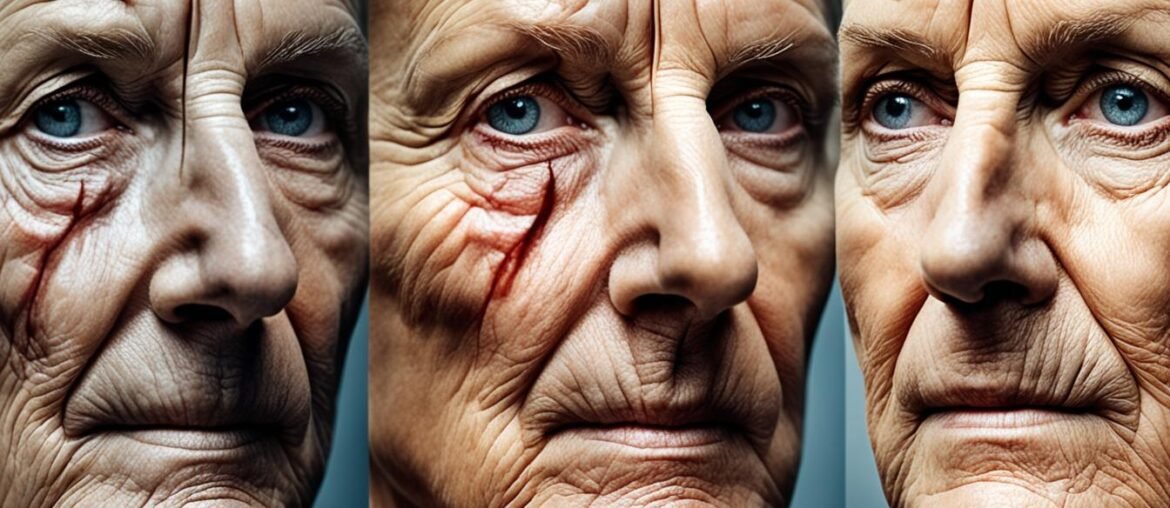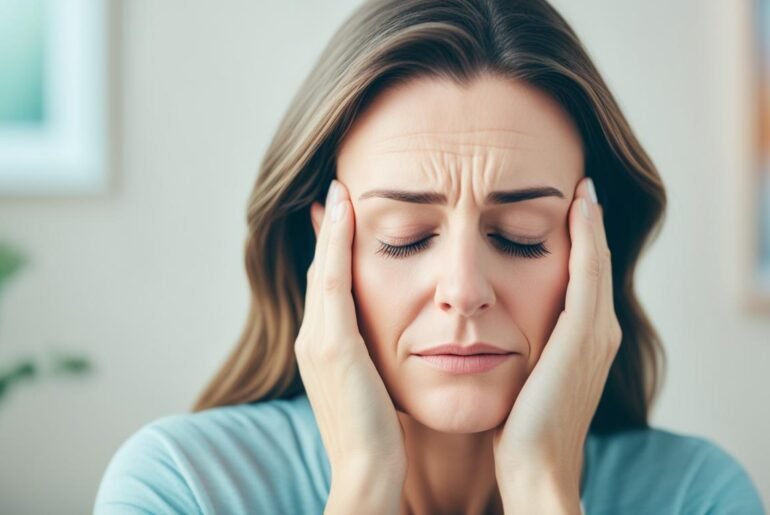Did you know that chronic stress can accelerate the aging process and contribute to the formation of wrinkles on the skin? It’s not just a matter of feeling overwhelmed; the impact of stress on our skin is real and significant.
Studies have shown that the hormones released during periods of stress, such as cortisol, can break down collagen, a protein that helps maintain skin elasticity. Additionally, repeated facial expressions and furrowing of the brow, common responses to stress, can contribute to the formation of wrinkles.
But that’s not all. Chronic stress can also lead to increased oil production, impaired barrier function of the skin, and reduced skin elasticity, all of which are factors that contribute to the development of wrinkles.
Understanding the effects of chronic stress on the skin can help individuals develop strategies for managing stress and maintaining healthier, more youthful-looking skin.
Key Takeaways:
- Chronic stress can accelerate the aging process and contribute to the formation of wrinkles.
- The hormones released during periods of stress can break down collagen, reducing skin elasticity.
- Repeated facial expressions and furrowing of the brow, common responses to stress, can also contribute to the formation of wrinkles.
- Chronic stress can lead to increased oil production, impaired barrier function of the skin, and reduced skin elasticity, all of which contribute to wrinkle development.
- Managing stress and adopting healthy skincare habits can help mitigate the effects of stress on the skin.
Acne and Stress
Chronic stress has a significant impact on our skin, particularly when it comes to the development and severity of acne. Stress-induced acne occurs when the body releases higher levels of the hormone cortisol in response to stress. This hormonal surge stimulates the production of oil in the skin, leading to clogged pores and the formation of acne.
A study conducted on the relationship between stress and acne severity found that higher levels of stress were associated with increased acne severity. This correlation underscores the importance of managing stress and its impact on our skin.
To prevent and treat stress-induced acne, it’s crucial to be mindful of our skincare routine. Incorporating stress management techniques, such as practicing mindfulness, engaging in regular exercise, and getting enough sleep, can help regulate cortisol levels and reduce the risk of acne flare-ups.
Additionally, establishing a consistent skincare routine that includes gentle cleansing, exfoliation, and the use of acne-fighting ingredients can help effectively manage acne. This includes utilizing products with salicylic acid, benzoyl peroxide, or retinoids, which target acne-causing bacteria, unclog pores, and promote skin cell turnover.
Managing and reducing stress in our lives is not only beneficial for our overall well-being but also plays a crucial role in maintaining clear and healthy skin.
By actively addressing stress and implementing effective skincare practices, we can minimize the impact of stress-induced acne and improve the overall health and appearance of our skin.
Tips for Managing Stress-Induced Acne
| Tips | Description |
|---|---|
| Practice stress management techniques | Engage in activities such as meditation, yoga, or deep breathing exercises to lower stress levels and regulate cortisol production. |
| Establish a consistent skincare routine | Cleanse, exfoliate, and moisturize regularly to remove impurities, unclog pores, and promote skin health. |
| Use acne-fighting ingredients | Choose products with salicylic acid, benzoyl peroxide, or retinoids to combat acne-causing bacteria and promote skin cell turnover. |
| Avoid trigger foods | Reduce the consumption of greasy and sugary foods, which can exacerbate acne. |
| Take care of your physical and mental well-being | Engage in regular exercise, prioritize restful sleep, and seek support from loved ones to maintain a balanced lifestyle. |
By implementing these tips and adopting a holistic approach to skincare and stress management, individuals can effectively tackle stress-induced acne and achieve clearer, healthier skin.
Bags Under the Eyes and Stress
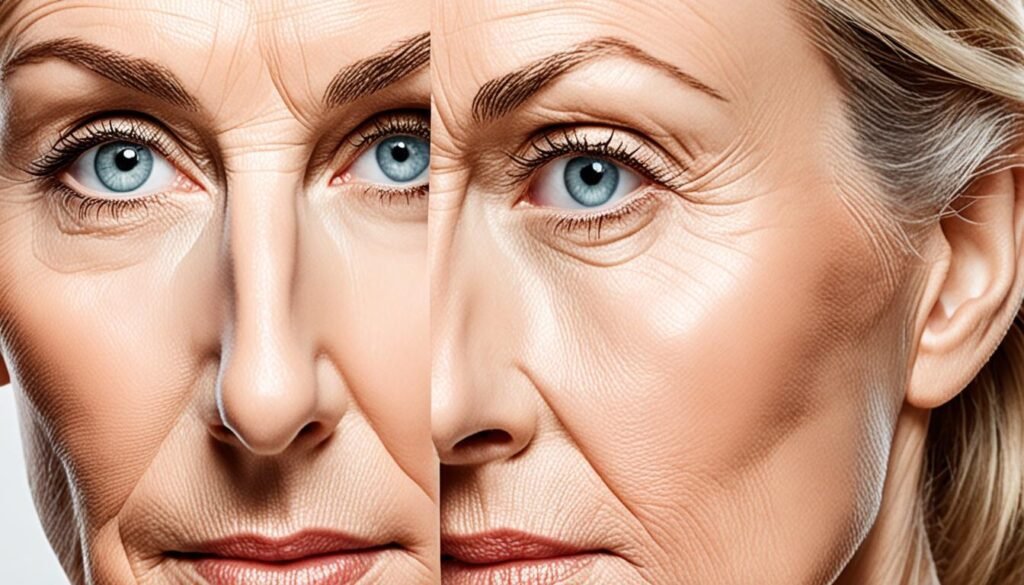
Bags under the eyes are a common sign of aging and can be exacerbated by chronic stress. Stress can lead to sleep deprivation and increased fatigue, causing the delicate skin under the eyes to become swollen and puffy. Additionally, stress can contribute to a loss of skin elasticity, making the bags under the eyes more pronounced.
Managing stress and prioritizing restful sleep are essential strategies for reducing the appearance of bags under the eyes. By implementing stress-relieving techniques and adopting a healthy sleep routine, individuals can improve the overall health and appearance of their under-eye area.
Strategies for Managing Stress and Reducing Eye Bags
- Practice relaxation techniques such as deep breathing, meditation, or yoga to reduce stress levels.
- Create a consistent sleep schedule and aim for 7-9 hours of quality sleep each night.
- Avoid excessive caffeine consumption and limit alcohol intake, as they can disrupt sleep patterns.
- Engage in regular exercise to reduce stress and improve overall well-being.
- Consider using a cool compress or cucumber slices to temporarily reduce under-eye puffiness.
- Apply a gentle eye cream or serum specifically designed to target under-eye bags and promote skin elasticity.
- Stay hydrated by drinking an adequate amount of water throughout the day.
- Seek social support and maintain strong connections with loved ones to help manage and alleviate stress.
By incorporating these strategies into your daily routine, you can effectively manage stress and minimize the appearance of bags under the eyes. Remember, taking care of your overall well-being is key to maintaining healthy, youthful-looking skin.
Dry Skin and Stress
Chronic stress can have a detrimental effect on the health and appearance of your skin. One of the common manifestations of stress is dry skin, which can cause discomfort and affect your overall well-being. When you experience stress, it can disrupt the function of the stratum corneum, the outermost layer of your skin responsible for maintaining hydration and acting as a protective barrier.
Studies have shown that stress can impair the barrier function of the stratum corneum and hinder its ability to retain water, resulting in dry and flaky skin. This stress-induced dryness can leave your skin feeling tight, itchy, and rough.
To combat dry skin caused by stress, it is essential to prioritize a skincare routine that focuses on hydrating and nourishing your skin. Here are some tips to help restore moisture and alleviate dryness:
- Use a gentle cleanser: Opt for a mild, hydrating cleanser that won’t strip away the skin’s natural oils. Avoid hot water, as it can further dry out your skin.
- Moisturize regularly: Apply a moisturizer that is rich in hydrating ingredients such as hyaluronic acid or ceramides. This will help replenish moisture and strengthen the skin’s barrier function.
- Protect your skin: Shield your skin from harsh environmental factors by using a broad-spectrum sunscreen with an SPF of at least 30. This will prevent further damage and dehydration.
- Stay hydrated: Drink plenty of water throughout the day to keep your skin hydrated from within. Hydration plays a crucial role in maintaining the health and moisture balance of your skin.
By implementing these skincare practices and managing your stress levels, you can help combat dry skin and promote a healthier, more radiant complexion.
Rashes and Stress
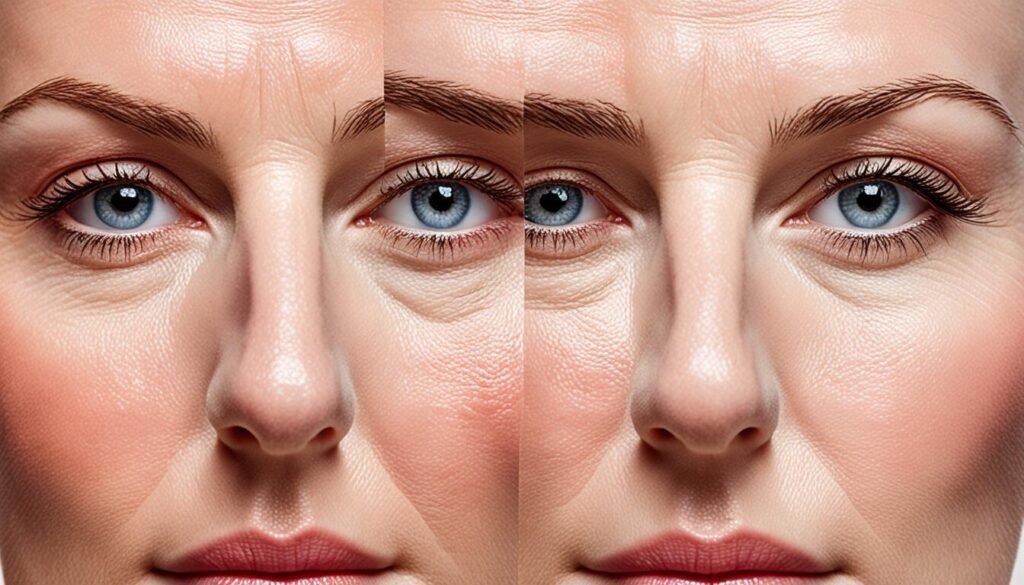
Stress can have a profound impact on skin health, contributing to the development of rashes and inflammation. When we experience chronic stress, it weakens our immune system and disrupts the natural balance of bacteria on our skin. This disruption can lead to increased skin sensitivity and inflammation, resulting in the development or exacerbation of rashes and skin conditions.
Conditions such as psoriasis, eczema, and contact dermatitis can be triggered or aggravated by chronic stress. The body’s stress response can cause an overactive immune response, leading to skin inflammation and the formation of rashes. These rashes may be itchy, red, and uncomfortable, causing further distress to individuals already dealing with the effects of chronic stress.
Managing stress is crucial in reducing the occurrence and severity of stress-related rashes. By incorporating relaxation techniques into our daily routines, such as meditation, deep breathing exercises, and engaging in activities we find enjoyable, we can help alleviate stress and promote overall skin health. Additionally, adopting skincare routines that prioritize the health and integrity of our skin barrier can help reduce the risk of rashes and inflammation.
Using gentle, hydrating skincare products that do not irritate the skin is essential. It is important to avoid harsh cleansers and chemicals that may further aggravate the skin. Incorporating moisturizers and emollients into our skincare routine can help keep the skin hydrated and enhance its natural barrier function, reducing the risk of inflammation and rashes.
Tip: When selecting skincare products, look for those specifically formulated for sensitive skin or designed to soothe and calm inflamed skin. These products often contain ingredients like oatmeal, aloe vera, and chamomile, which can help reduce redness and irritation.
Furthermore, maintaining a healthy lifestyle and seeking social support can help manage stress levels and provide additional benefits for overall well-being, including skin health. Incorporating regular exercise, getting adequate sleep, and eating a balanced diet can all contribute to stress reduction and healthier skin.
Remember, managing stress is a vital component of promoting skin health and minimizing the occurrence of stress-induced rashes. By taking proactive steps to reduce stress and prioritize self-care, we can support our skin’s natural resilience and maintain a healthy, radiant complexion.
Wrinkles and Stress
Chronic stress can have a profound impact on the health and appearance of the skin, leading to the formation of wrinkles. When we experience stress, hormones like cortisol are released, which can break down collagen – a protein that helps maintain the elasticity of our skin. This collagen breakdown contributes to the development of wrinkles, making them more prominent and noticeable.
In addition to hormonal changes, repeated facial expressions and furrowing of the brow, often seen when we are stressed, can also contribute to the formation of wrinkles. These repetitive movements can lead to the development of fine lines and deep wrinkles, further adding to the visible signs of aging on the skin.
To mitigate the effects of stress on the skin, it is important to adopt healthy skincare habits and manage stress effectively. Sun protection is crucial, as exposure to harmful UV rays can accelerate the aging process and exacerbate the formation of wrinkles. Additionally, incorporating anti-aging products into your skincare routine can help counteract the effects of stress-induced collagen breakdown.
By implementing stress management techniques and prioritizing self-care, you can help preserve the health and appearance of your skin, reducing the impact of stress-induced wrinkles.
Graying Hair and Hair Loss

Chronic stress can have a significant impact on the health and appearance of your hair. Studies have shown a correlation between stress and graying hair, as well as increased hair loss. Let’s explore how stress-induced factors can affect your hair color and condition.
When you experience chronic stress, the stem cells responsible for hair pigmentation can disappear, resulting in graying hair. This occurs because stress triggers an imbalance in the production of melanin, the pigment that gives hair its color. As a result, the hair shaft lacks the necessary coloration, leading to the appearance of gray or white hair.
Additionally, stress can disrupt the hair growth cycle and contribute to a condition known as telogen effluvium. This condition causes an increased number of hair follicles to enter the resting phase, leading to excessive hair shedding. While this shedding is temporary and the hair usually regrows once the stress is managed, prolonged periods of stress can exacerbate the condition and lead to more noticeable hair loss.
To help mitigate the effects of stress on your hair, it’s essential to prioritize stress management techniques and maintain a healthy lifestyle. Here are some tips:
- Practice stress-reducing activities such as yoga, meditation, or deep breathing exercises.
- Engage in regular exercise to promote overall well-being and reduce stress levels.
- Ensure a balanced diet rich in essential nutrients for hair health, such as vitamins A, C, and E, biotin, and omega-3 fatty acids.
- Get enough sleep to support the proper functioning of your body, including hair growth.
Image: Graying hair and stress
By managing stress and adopting a healthy lifestyle, you can help preserve the color and condition of your hair. It’s important to consult with a healthcare professional or a trichologist if you are concerned about excessive hair loss or significant changes in hair color, as they can provide personalized advice and recommend appropriate treatments or interventions.
Other Facial Effects of Stress

In addition to the more visible effects of chronic stress on the skin, such as wrinkles and acne, stress can also contribute to other facial issues. These effects can manifest in various ways, resulting in discomfort and potential long-term consequences.
Teeth Grinding and Stress
Teeth grinding, also known as bruxism, is a common response to stress. Many individuals unknowingly clench or grind their teeth during periods of heightened stress or anxiety. This can lead to tooth damage, jaw pain, and temporomandibular joint dysfunction (TMD). TMD is a condition that affects the jaw joint and can cause pain and difficulty with jaw movements. Recognizing teeth grinding as a symptom of stress is crucial in preventing further dental complications.
Face Flushing and Stress
Stress can cause changes in breathing patterns, leading to face flushing. This phenomenon occurs when blood vessels in the face dilate, resulting in a reddish or flushed appearance. Face flushing can be an uncomfortable and noticeable symptom of stress, making individuals self-conscious or anxious. Understanding this physiological response can help individuals manage their stress levels and adopt relaxation techniques to alleviate face flushing.
Sore Lips and Stress
During periods of stress, individuals may develop the habit of chewing their lips or the inside of their mouth. This repetitive behavior can result in sore lips and additional discomfort. It’s essential to recognize this habit as a stress-related response and find healthier alternatives to reduce stress, such as deep breathing exercises or engaging in relaxing activities.
“It’s crucial to understand and recognize the various facial effects of stress. By addressing these issues and seeking appropriate treatment if necessary, individuals can enhance their overall well-being and quality of life.”
Being aware of these facial effects of stress is important in taking preventative measures and seeking appropriate treatment if necessary. By managing stress levels through relaxation techniques, seeking professional assistance, and adopting healthy habits, individuals can minimize the negative impact on their facial well-being.
| Facial Effect | Cause | Impact |
|---|---|---|
| Teeth Grinding | Response to stress | Tooth damage, jaw pain, TMD |
| Face Flushing | Changes in breathing patterns | Reddish or flushed appearance |
| Sore Lips | Habitual chewing due to stress | Discomfort and potential skin damage |
Coping with Stress

Effectively managing stress is crucial for maintaining overall health, including the health and appearance of the skin. Incorporating stress management techniques into daily life can help reduce the negative impact of stress on the skin.
- Relaxation activities: Engaging in relaxation activities such as yoga or meditation can help calm the mind and promote a sense of well-being. These practices can reduce stress hormone levels and promote healthy skin.
- Regular exercise: Physical activity has been shown to reduce stress and improve mood. Incorporating regular exercise into your routine can help relieve stress, boost circulation, and promote a healthy complexion.
- Maintain a healthy diet: Eating a balanced diet rich in fruits, vegetables, whole grains, and lean proteins can provide essential nutrients that support healthy skin. Avoiding processed foods, caffeine, and alcohol can also help reduce stress levels.
Additionally, prioritizing restful sleep is important for managing stress and promoting skin health. Lack of sleep can exacerbate stress levels and contribute to skin issues such as dullness and puffy eyes.
Seeking social support: Connecting with others and sharing your feelings can help alleviate stress. Talking to a trusted friend or family member, or joining a support group, can provide emotional support and help reduce the negative impact of stress on your well-being.
Relaxation Techniques for Stress Relief
Incorporating relaxation techniques into your daily routine can provide relief from stress and promote healthier, more radiant skin.
- Breathing exercises: Deep breathing exercises can help activate the body’s relaxation response, reducing stress levels and promoting a sense of calm.
- Progressive muscle relaxation: This technique involves tensing and then releasing each muscle group in your body, promoting relaxation and reducing muscle tension caused by stress.
- Guided imagery: Visualization exercises can help transport your mind to a peaceful and calming place, reducing stress and promoting a sense of well-being.
Experiment with different relaxation techniques to find what works best for you. Incorporating these practices into your daily routine can help manage stress levels and promote healthier skin.
Developing Healthy Lifestyle Habits
Adopting healthy lifestyle habits can have a significant impact on stress levels and skin health.
- Getting regular exercise: Engaging in physical activity not only reduces stress but also promotes overall well-being. Aim for at least 30 minutes of moderate exercise most days of the week.
- Practicing good sleep hygiene: Establish a regular sleep schedule and create a relaxing bedtime routine to improve sleep quality and reduce stress levels.
- Hydrating properly: Drink plenty of water throughout the day to keep your skin hydrated and support its natural functions.
- Following a balanced diet: Eat a variety of fruits, vegetables, whole grains, lean proteins, and healthy fats to nourish your body and support optimal skin health.
By prioritizing self-care and making healthy lifestyle choices, you can better cope with stress and promote healthier, more resilient skin.
Skincare Tips for Stress-Related Skin Issues
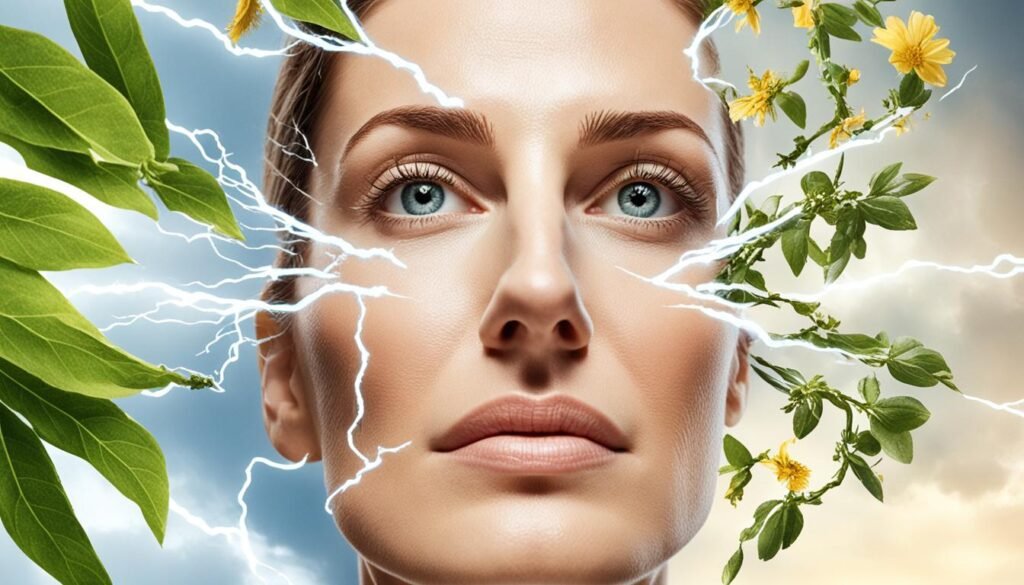
Managing stress is crucial for maintaining healthy skin. In addition to implementing stress management techniques, incorporating a consistent skincare routine can help mitigate the effects of stress on the skin. Here are some essential skincare tips to address stress-related skin issues:
1. Hydration and Nourishment
Stress can dehydrate the skin, leading to dryness and impaired barrier function. To counteract dryness, it is important to prioritize hydration. Drink plenty of water throughout the day to keep your skin hydrated from within. Additionally, use a moisturizer with hydrating ingredients, such as hyaluronic acid or glycerin, to lock in moisture and nourish the skin. Consider incorporating a hydrating face mask into your skincare routine once or twice a week for an added boost of hydration.
2. Sun Protection
Exposure to the sun’s harmful UV rays can further damage stressed skin and accelerate signs of aging. Protect your skin from the sun by wearing sunscreen with a minimum SPF of 30, even on cloudy days. Apply sunscreen generously to all exposed areas, including the face, neck, and hands. Don’t forget to reapply every two hours, especially if you are spending prolonged periods outdoors.
3. Anti-Aging Products
Chronic stress can contribute to the development of wrinkles and premature aging. Incorporating anti-aging products into your skincare routine can help minimize the appearance of wrinkles and promote collagen production. Look for products containing retinoids, such as retinol, which can improve skin texture and reduce the signs of aging. Vitamin C serums can also provide antioxidant protection and promote a brighter complexion. Consult with a dermatologist or skincare professional to find the right anti-aging products for your specific needs.
4. Stress-Relieving Skincare Routine
Creating a skincare routine that helps alleviate stress can have a positive impact on both your skin and overall well-being. Take the time to cleanse your face thoroughly at least twice a day, using a gentle cleanser suitable for your skin type. Incorporate relaxing techniques, such as facial massages or applying a calming face oil, to help relieve tension and promote relaxation. Remember to be gentle with your skin and avoid harsh scrubbing or aggressive treatments, as these can further aggravate stress-related skin issues.
5. Seek Professional Guidance
If you are struggling with stress-related skin issues, it can be beneficial to consult with a dermatologist or skincare professional. They can provide personalized recommendations based on your skin type, concerns, and specific stress-related issues. A professional can help identify the most effective products and treatments to address your needs, ensuring you achieve optimal results.
| Skincare Tips for Stress-Related Skin Issues | |
|---|---|
| Hydration and Nourishment | Drink plenty of water and use a moisturizer with hydrating ingredients. |
| Sun Protection | Wear sunscreen with at least SPF 30 and reapply every two hours. |
| Anti-Aging Products | Incorporate retinoids and vitamin C serums into your skincare routine. |
| Stress-Relieving Skincare Routine | Create a relaxing skincare routine to alleviate stress and promote relaxation. |
| Seek Professional Guidance | Consult with a dermatologist or skincare professional for personalized recommendations. |
Skincare Products to Support Skin Health

When it comes to combating stress-related skin issues, incorporating the right skincare products into your routine can make a world of difference. Look for products that contain ingredients known for their abilities to nourish and rejuvenate the skin, helping to mitigate the effects of stress. Here are some key ingredients to look out for:
Retinoids
Retinoids, such as retinol, are a powerhouse ingredient for improving the appearance of wrinkles and promoting collagen production. These compounds work by stimulating cell turnover, resulting in smoother, more youthful-looking skin. Incorporating a retinoid product into your skincare routine can help combat stress-induced wrinkles and promote a more vibrant complexion.
Vitamin C Serum
Vitamin C is known for its antioxidant properties, which can help protect the skin from damage caused by stress and environmental factors. Including a vitamin C serum in your skincare regimen can help brighten the complexion and even out skin tone. Look for a serum with a stable form of vitamin C, such as ascorbic acid or magnesium ascorbyl phosphate, for maximum effectiveness.
Hydrating and Anti-Aging Ingredients
Stress can cause the skin to become dry and dehydrated, exacerbating the appearance of wrinkles and other signs of aging. Choose skincare products with hydrating ingredients such as hyaluronic acid, glycerin, or ceramides to replenish moisture and restore the skin’s natural barrier function. Additionally, look for products that contain anti-aging ingredients like peptides, niacinamide, or antioxidants to promote skin health and combat the effects of stress on the skin.
Consulting with a skincare professional can help you determine the most suitable products for your individual needs. They can assess your skin type and concerns, and recommend specific products or ingredients that will best support your skin’s health and resilience.
Conclusion
Chronic stress takes a toll on both our physical and mental well-being, and our skin is no exception. The effects of stress on the skin can manifest in various ways, including acne, wrinkles, dryness, and rashes. Understanding how stress impacts our skin is crucial in developing effective strategies to mitigate its negative effects.
Implementing stress management techniques, such as practicing mindfulness, engaging in relaxation activities, and seeking social support, can significantly improve our skin’s resilience. Alongside stress management, maintaining a consistent skincare routine that focuses on hydration, protection, and anti-aging can help maintain the health and appearance of our skin.
Remember, self-care is key. Prioritize your well-being by prioritizing stress management and seeking professional guidance when needed. By taking proactive steps to manage stress and care for your skin, you can promote healthier and more radiant skin, allowing your inner beauty to shine through.
FAQ
What are the effects of chronic stress on skin wrinkles?
Chronic stress can accelerate the aging process and contribute to the formation of wrinkles. Stress hormones can break down collagen, a protein that helps maintain skin elasticity. Additionally, repeated facial expressions and furrowing of the brow, common responses to stress, can contribute to the formation of wrinkles.
Is there a link between chronic stress and acne?
Yes, chronic stress has been linked to the development and worsening of acne. The hormone cortisol, released during periods of stress, stimulates oil production in the skin. Higher levels of stress are associated with increased acne severity.
How does chronic stress contribute to bags under the eyes?
Chronic stress can lead to sleep deprivation and increased fatigue, causing the delicate skin under the eyes to become swollen and puffy. Stress can also contribute to a loss of skin elasticity, making eye bags more pronounced.
Can chronic stress cause dry skin?
Yes, chronic stress can disrupt the skin’s outermost layer, known as the stratum corneum, leading to dry and itchy skin. Stress impairs the barrier function of the stratum corneum and negatively affects the skin’s ability to retain water.
Do stress and rashes have a connection?
Yes, chronic stress can weaken the immune system and disrupt the balance of bacteria on the skin, leading to inflammation and the development of rashes. Conditions such as psoriasis, eczema, and contact dermatitis can be triggered or aggravated by stress.
Does chronic stress contribute to graying hair and hair loss?
Yes, studies have shown that chronic stress can cause stem cells responsible for hair pigmentation to disappear, resulting in graying hair. Stress can also disrupt the hair growth cycle and contribute to a condition called telogen effluvium, which leads to increased hair loss.
What other facial effects can stress have?
Chronic stress can lead to teeth grinding, which can cause tooth damage and temporomandibular joint dysfunction (TMD). Stress can also cause face flushing due to changes in breathing patterns and lead to the habit of chewing lips or the inside of the mouth, resulting in sore lips.
How can I cope with stress?
It is important to incorporate stress management techniques into daily life, such as relaxation activities like yoga or meditation, engaging in regular exercise, maintaining a healthy diet, prioritizing restful sleep, and seeking social support.
Yes, maintaining a consistent skincare routine is crucial. Focus on hydrating and nourishing the skin to counteract dryness and promote barrier function. Sun protection is important to prevent further damage and premature aging. Incorporating anti-aging products that target wrinkles and promote collagen production can be beneficial.
What skincare products can support skin health under chronic stress?
Skincare products such as retinoids (like retinol) can stimulate collagen production and improve the appearance of wrinkles. Vitamin C serums provide antioxidant protection and promote skin brightening. Look for products that contain hydrating and anti-aging ingredients to nourish and support the skin’s natural function.

